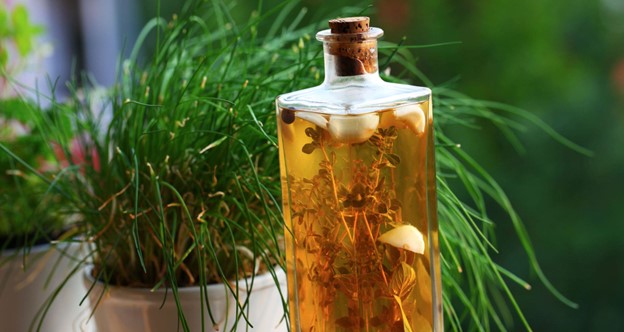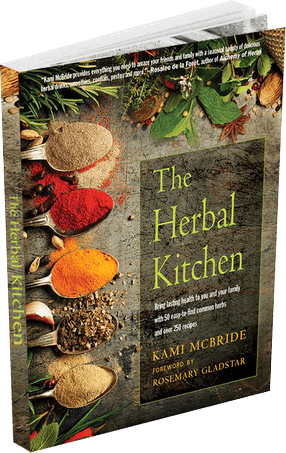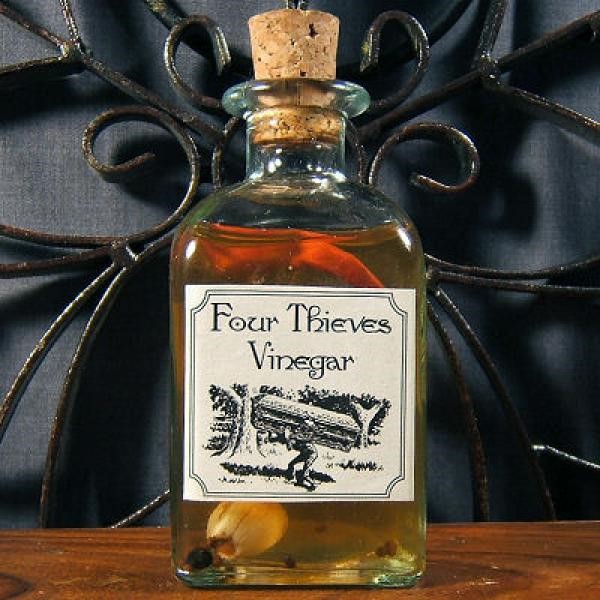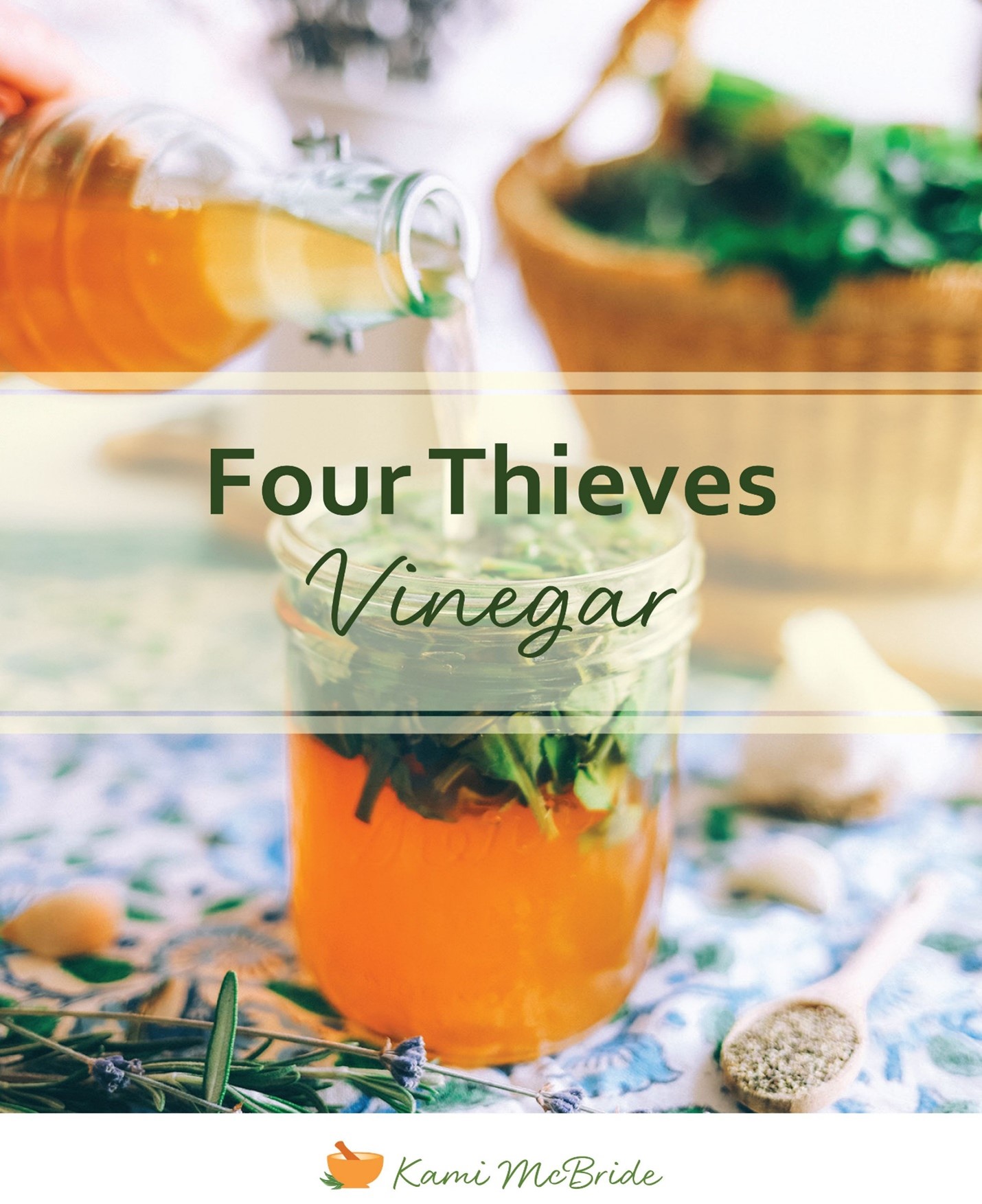Turns Out, the Four Thieves Knew Their Stuff!
One very helpful site you might want to visit is Kami McBride’s—www.kamimcbride.com. She has a lovely newsletter as well. Last week I received some information I just have to pass on that’s so relevant to the times we’re in.
Kami said, “In 1346, a plague spread through Europe. Telltale signs of the disease were fever and swollen skin sores that made the skin look black. Caused by an outbreak of Yersinia pestis, a bacteria spread by fleas, the Black Death is believed to have killed millions of Europeans in the span of a few years —a third of the continent’s population at the time.

“It’s said that people used aromatic herbs to protect themselves from catching the disease. This specific legend tells of a team of grave robbers who avoided the plague with homemade preparations.
“As folklore is wont to do, details shift from one telling to the next. I personally heard this tale from many of my early herb teachers that I studied with in the 1980’s. Some say these herbs were distilled into a hydrosol or essential oil. Some say the four thieves wore masks soaked in vinegar, aromatic oils, herbs, and spices as a way to protect themselves. The variations on the spices I have seen associated with this legend are many!”

Whatever the true story is, you have to admit, the 4 Thieves knew their stuff, and the idea speaks to our day. And as Kami delved deeper into it, she could see the possibilities were enormous. Thus she decided to make up her own recipe. She’s since written a book on the uses for herbs (THE HERBAL KITCHEN) and has an entire chapter on herbal vinegars. This is where you’ll find her recipe for “Four Thieves Vinegar.”

She also relates that as time went by, her website visitors and HERBAL KITCHEN readers were sending story after story of how this vinegar had become the go-to remedy for colds! Each one said they wouldn't head into cold season without a batch of Four Thieves Vinegar!

Abundant research shows that aromatic herbs do defend against pathogens. The volatile oils that give these herbs their distinctive scents also have antimicrobial actions. These are plants’ innate defense against environmental stressors, including pathogens.
A tried-and-true folk remedy, the specifics of the original recipe are unknown, and many herbalists have perfected their own version of Four Thieves Vinegar. Here’s Kami’s. And by the way, she says it also makes a great salad dressing and marinade!

1/2 cup finely chopped, fresh lavendar
1/2 cup finely chopped fresh rosemary
1/4 cup finely chopped fresh sage
1/4 cup finely chopped fresh thyme
2 finely shopped fresh peppermint
3 cloves garlic finely chopped
1 tablespoon black pepper
3 cups apple cider vinegar
Directions:
Add Recipe to Cook'n
blog comments powered by Disqus
Kami said, “In 1346, a plague spread through Europe. Telltale signs of the disease were fever and swollen skin sores that made the skin look black. Caused by an outbreak of Yersinia pestis, a bacteria spread by fleas, the Black Death is believed to have killed millions of Europeans in the span of a few years —a third of the continent’s population at the time.

“It’s said that people used aromatic herbs to protect themselves from catching the disease. This specific legend tells of a team of grave robbers who avoided the plague with homemade preparations.
“As folklore is wont to do, details shift from one telling to the next. I personally heard this tale from many of my early herb teachers that I studied with in the 1980’s. Some say these herbs were distilled into a hydrosol or essential oil. Some say the four thieves wore masks soaked in vinegar, aromatic oils, herbs, and spices as a way to protect themselves. The variations on the spices I have seen associated with this legend are many!”

Whatever the true story is, you have to admit, the 4 Thieves knew their stuff, and the idea speaks to our day. And as Kami delved deeper into it, she could see the possibilities were enormous. Thus she decided to make up her own recipe. She’s since written a book on the uses for herbs (THE HERBAL KITCHEN) and has an entire chapter on herbal vinegars. This is where you’ll find her recipe for “Four Thieves Vinegar.”

She also relates that as time went by, her website visitors and HERBAL KITCHEN readers were sending story after story of how this vinegar had become the go-to remedy for colds! Each one said they wouldn't head into cold season without a batch of Four Thieves Vinegar!

Abundant research shows that aromatic herbs do defend against pathogens. The volatile oils that give these herbs their distinctive scents also have antimicrobial actions. These are plants’ innate defense against environmental stressors, including pathogens.
A tried-and-true folk remedy, the specifics of the original recipe are unknown, and many herbalists have perfected their own version of Four Thieves Vinegar. Here’s Kami’s. And by the way, she says it also makes a great salad dressing and marinade!

4 Thieves Vinegar
Ingredients:
1/2 cup finely chopped, fresh lavendar
1/2 cup finely chopped fresh rosemary
1/4 cup finely chopped fresh sage
1/4 cup finely chopped fresh thyme
2 finely shopped fresh peppermint
3 cloves garlic finely chopped
1 tablespoon black pepper
3 cups apple cider vinegar
Directions:
1. Fill a quart-size glass jar with the herbs and spices.
2. Pour vinegar over the ingredients, filling the jar to the top with vinegar. The vinegar should cover the ingredients by at least a couple of inches.
3. Close the lid. If you’re using a metal lid, cover the opening of the jar with two sheets of wax paper before putting the lid on. Plastic lids work well for this recipe
4. Store vinegar in a cool dark place for one month. Shake it once in a while and occasionally check to see if you need to add more vinegar, as some might get soaked up by the plant material. If the herbs are sticking out above the vinegar, add more vinegar.
5. Decant.
6. After one month, strain the herbs from the vinegar.
7. Place a funnel into the opening of a clean, sterilized jar. Lay muslin over the top of the funnel.
8. Pour your infused vinegar through the muslin.
9. Let the vinegar strain through the cloth and funnel into the clean jar.
10. Don’t squeeze the muslin, as that will squeeze water from the plant material, shortening the shelf life of your vinegar and making it cloudy.
11. Discard the strained ingredients into the compost. The liquid left behind is your herbal vinegar.
TO USE: Take a tablespoon each morning to help support your immunity. If you have a sensitive stomach, then dilute in water. This zesty flavor also works well added to salad dressings, marinades, and bloody Mary’s as a delicious way to bring kitchen magic into your home.
STORAGE: Store your herbal vinegar in a container with a plastic or cork lid, as the vinegar will corrode metal. Place the container in a cabinet away from heat and light, and in a place with consistent temperatures. Your vinegar should last for about one year. If it turns black, has floating chunks, mold, or a funny smell, throw it away.
2. Pour vinegar over the ingredients, filling the jar to the top with vinegar. The vinegar should cover the ingredients by at least a couple of inches.
3. Close the lid. If you’re using a metal lid, cover the opening of the jar with two sheets of wax paper before putting the lid on. Plastic lids work well for this recipe
4. Store vinegar in a cool dark place for one month. Shake it once in a while and occasionally check to see if you need to add more vinegar, as some might get soaked up by the plant material. If the herbs are sticking out above the vinegar, add more vinegar.
5. Decant.
6. After one month, strain the herbs from the vinegar.
7. Place a funnel into the opening of a clean, sterilized jar. Lay muslin over the top of the funnel.
8. Pour your infused vinegar through the muslin.
9. Let the vinegar strain through the cloth and funnel into the clean jar.
10. Don’t squeeze the muslin, as that will squeeze water from the plant material, shortening the shelf life of your vinegar and making it cloudy.
11. Discard the strained ingredients into the compost. The liquid left behind is your herbal vinegar.
TO USE: Take a tablespoon each morning to help support your immunity. If you have a sensitive stomach, then dilute in water. This zesty flavor also works well added to salad dressings, marinades, and bloody Mary’s as a delicious way to bring kitchen magic into your home.
STORAGE: Store your herbal vinegar in a container with a plastic or cork lid, as the vinegar will corrode metal. Place the container in a cabinet away from heat and light, and in a place with consistent temperatures. Your vinegar should last for about one year. If it turns black, has floating chunks, mold, or a funny smell, throw it away.
Recipe formatted with the Cook'n Recipe Software from DVO Enterprises.
 Alice Osborne
Alice Osborne
Weekly Newsletter Contributor since 2006
Email the author! alice@dvo.com
Sources:
- www.slideplayer.com
- www.farmersalmanac.com
- www.m.seredonline.sk
- www.kamimcbride.com
